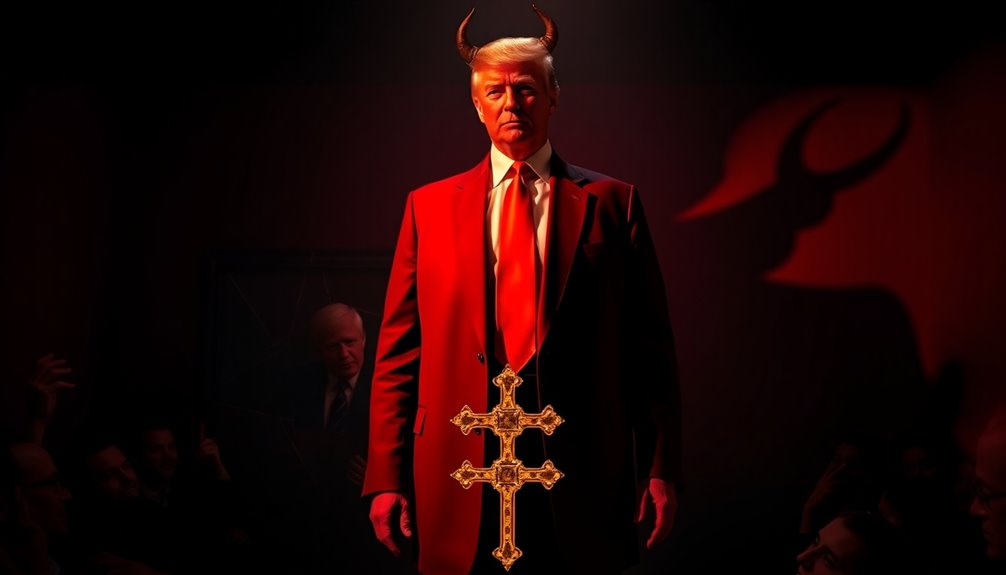You might find comparisons between Donald Trump and the Antichrist intriguing due to his charismatic leadership and polarizing tactics. Many critics see echoes of biblical warnings about deception and false prophets in his demand for unwavering loyalty from supporters. His divisive rhetoric raises concerns among some Christians, aligning with characteristics often associated with the Antichrist. While these comparisons can stem from politically charged discussions, the Antichrist concept is multifaceted and historically rooted. To understand the broader implications and different views surrounding this topic, there's much more to explore that could deepen your perspective.
Key Takeaways
- Trump exhibits charismatic leadership and demands unwavering loyalty, traits often associated with the biblical Antichrist.
- Critics argue that Trump's divisive rhetoric and policies align with themes of deception and opposition to Christian values.
- His strong support from evangelical groups raises concerns about political pragmatism overshadowing traditional Christian ethics.
- Many view Trump's persona as reminiscent of historical antichrists, emphasizing global upheaval and collective resistance to Christian principles.
- Labeling Trump as the Antichrist is often politically motivated, with no biblical texts explicitly identifying contemporary figures as such.
Introduction
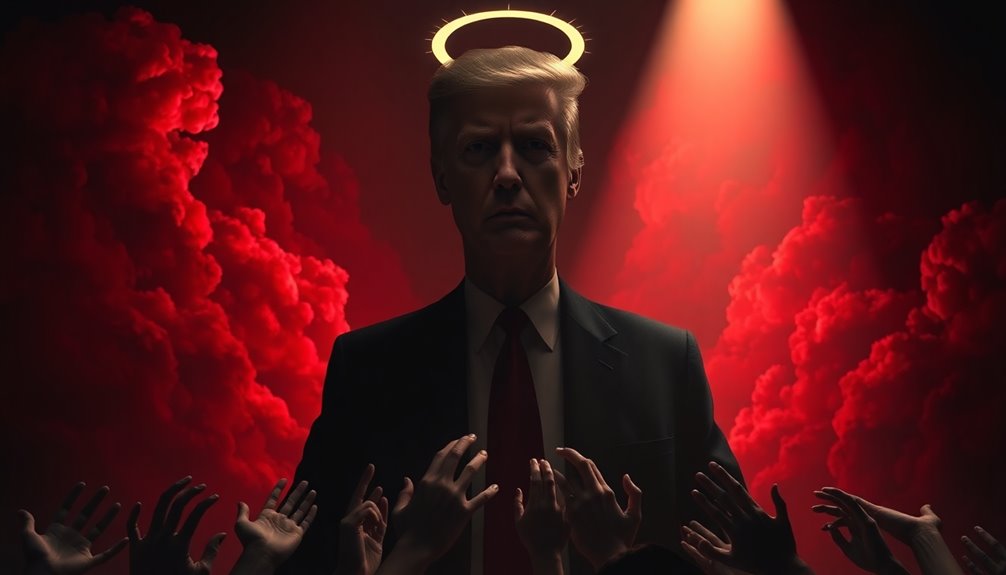
The concept of the Antichrist has captivated minds for centuries, and today, many are drawing parallels between this figure and Donald Trump. This comparison stems from Trump's charismatic leadership style, which has attracted a large following. Critics argue that his actions often promote division and contradict core Christian teachings, leading some to view him as a modern embodiment of the antichrist.
In political discourse, Trump's demand for unwavering loyalty from his supporters resembles the expectation of allegiance that characterizes the Antichrist. This raises concerns about prioritizing political allegiance over faith, prompting believers to question the implications of such loyalty.
Moreover, the biblical prophecy surrounding the Antichrist describes a figure who deceives on a global scale. Some individuals interpret Trump's rhetoric and behavior as aligning with these characteristics, fueling ongoing speculation about his role in contemporary politics.
While definitive identification of Trump as the antichrist remains speculative, the conversation surrounding this topic continues to evolve, reflecting deeper anxieties about leadership, faith, and morality in today's world.
As the debate unfolds, you may find yourself contemplating the implications of this comparison in your own beliefs and perceptions.
Biblical Antichrist Characteristics

When you look at the biblical characteristics of the Antichrist, you'll notice traits like charisma, arrogance, and a tendency to deceive.
Key scriptures highlight how this figure could rise to power by forging false peace and demanding loyalty, mirroring some modern political dynamics.
Let's explore both primary and secondary Bible references that shed light on these traits and their implications.
Primary Bible References
Throughout the Bible, various passages outline the characteristics of the Antichrist, painting a vivid picture of this deceptive figure. In 2 Thessalonians 2:3-4, the Antichrist is described as the "man of lawlessness," who exalts himself against God, showcasing his arrogance and rebellion. This figure won't only attempt to deceive many but will also demand unwavering loyalty.
Revelation 13 further illustrates the Antichrist as a beast empowered by Satan, marked by blasphemous speech and a demand for worship. His ability to perform signs and wonders, as noted in 2 Thessalonians 2:9-10, indicates a global deception that could lead countless people astray. This kind of allure reflects the intense followings some political leaders command today.
Moreover, the Book of Daniel (9:27) suggests that the Antichrist would forge a peace covenant with Israel, emphasizing the political maneuvers that define his reign.
The concept of a revived Roman Empire hints at European roots, adding another layer to the Antichrist's identity and influence. These scriptural references serve as a warning to remain vigilant against deception in the world today.
Secondary Bible References
Several biblical references provide insight into the characteristics of the Antichrist, painting a picture of a leader who embodies charisma and deception. In 2 Thessalonians 2:3-4, you see a figure opposing everything divine, which some interpret as an echo of Trump the Antichrist. His ability to captivate and mislead aligns with the Antichrist's foretold performance of signs and wonders, drawing parallels to how certain leaders can inspire loyalty through powerful rhetoric.
Revelation 13 suggests the Antichrist wields authority granted by dark forces, emphasizing a close relationship with evil. This idea resonates with those who argue that political figures like Trump exhibit unsettling influence reminiscent of this biblical figure.
Furthermore, Daniel 9:27 prophesies a false peace, highlighting a leader who makes and breaks covenants, symbolizing betrayal.
Ultimately, the Antichrist's traits—intelligence, determination, and global reach—reflect a blend of political savvy and spiritual opposition to the teachings of Jesus. As you consider these characteristics, it's crucial to reflect on how they manifest in current political dynamics and the implications for society.
Antichrist in Early Christianity

Early Christianity's understanding of the Antichrist reflects the community's struggle against heresy and persecution. The term "Antichrist" emerged to describe figures denying Christ's divinity, a concern vividly articulated by the Apostle John, who warned of multiple antichrists in the last days (1 John 2:18).
This concept was deeply influenced by the socio-political climate of the Roman Empire, where emperors like Domitian demanded worship, mirroring the traits attributed to the Antichrist.
Early Christian thinkers, including Irenaeus and Hippolytus, portrayed the Antichrist as a future ruler who'd deceive many and lead them astray from true faith. They often linked him to Jewish descent, fulfilling prophetic expectations.
Interpretations varied; while some viewed the Antichrist as a singular future figure, others considered it a symbol of all forces opposing Christ throughout history.
The Book of Revelation vividly characterizes the Antichrist as a beast, representing ultimate opposition to God and the persecution faced by Christians.
This multifaceted understanding highlights the tension within early Christianity, as believers navigated a world hostile to their faith, identifying threats that challenged their beliefs and community.
Historical Context of Antichrist

The historical context of the Antichrist reveals a complex interplay between faith, politics, and societal challenges faced by early Christians. The concept emerges from early Christian writings, particularly in Revelation, likely penned during the reign of Emperor Domitian, who demanded divine acknowledgment and persecuted believers.
You see, early Christians encountered various antichrists, as highlighted in the first letter of John, pointing to a recurring pattern of opposition to Christ and the faith.
Throughout history, numerous leaders have been labeled as antichrists, illustrating how temptation and defiance against Christian teachings often manifest in political arenas. These historical figures frequently showcased traits like charisma and deception, aligning with the characteristics attributed to the Antichrist.
This broader interpretation suggests that the Antichrist isn't limited to a single individual but can symbolize a collective resistance against Christian values.
Moreover, the biblical role of the Antichrist is linked to global upheaval rather than being confined to American politics, emphasizing a focus on Israel and a revived Roman Empire.
Understanding this context helps you grasp the enduring relevance of the Antichrist in discussions about faith and authority throughout history.
Antichrist Identity Confusion
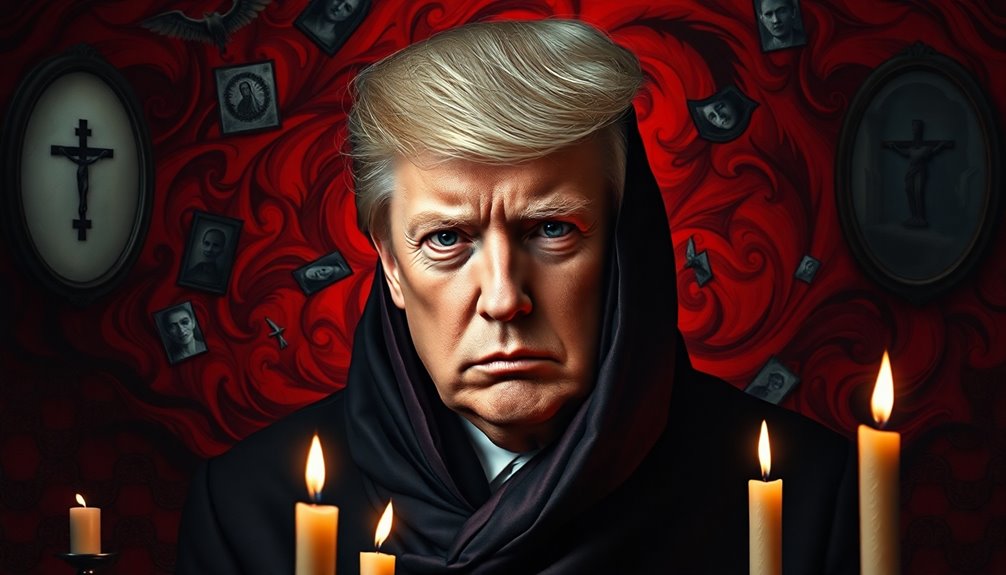
You might find it surprising how often figures like Trump and Obama get labeled as the Antichrist, despite lacking solid biblical ties to the role.
This confusion often stems from political bias and misconceptions about what the Antichrist truly represents.
Understanding Trump's appeal among evangelicals adds another layer to this debate, as it raises questions about the criteria we use for identifying such a complex figure.
Debunk Common Misconceptions
Labeling Donald Trump as the Antichrist stirs up confusion and misinterpretation of biblical texts. The Bible doesn't explicitly identify Trump or any contemporary figure as the Antichrist. Often, such labels are politically motivated rather than biblically supported.
Many interpretations of the Antichrist focus on characteristics like charisma and deception—traits that can be found in countless leaders throughout history, not just Trump.
Biblical prophecy indicates that the Antichrist will establish a peace covenant with Israel, a specific action Trump hasn't fulfilled in the way described in scripture.
Additionally, accusations of political figures being the Antichrist frequently arise from partisan disagreements, as seen with both Barack Obama and Trump being labeled by opposing factions.
It's crucial to remember that biblical prophecy primarily concerns events related to Israel and the broader world stage, with no direct references to the United States.
Thus, claims about American leaders as the Antichrist are speculative at best. By understanding these misconceptions, you can approach the topic with a clearer perspective, recognizing that the Antichrist's identity is rooted in deeper theological interpretations rather than contemporary political debates.
Trump's Popularity Among Evangelicals
Amidst the political landscape, Trump's popularity among evangelicals highlights a complex intertwining of faith and political allegiance. At campaign rallies, you'll notice the atmosphere resembles that of an evangelical gathering, complete with emotional appeals and sermon-style conclusions. This connection resonates deeply with many Trump supporters.
Despite his multiple marriages and various accusations of misconduct, evangelicals rally behind him, primarily due to his political agenda, particularly his Supreme Court appointments that influence abortion rights.
This shift in focus from traditional Christian values to political pragmatism raises eyebrows. Many evangelicals justify their support by emphasizing Trump's perceived power and influence, often drawing comparisons between him and biblical figures. Some even view him as divinely chosen, which can be problematic given scripture's warnings against pride and idolatry.
The alignment of Trump with evangelical voters brings forth questions about the intersection of faith and politics. This relationship fosters confusion about the implications of biblical prophecies concerning the Antichrist, challenging the very core of Evangelical Christianity.
As you navigate this landscape, consider how these dynamics shape beliefs and actions within the community.
Faith-Based Political Engagement
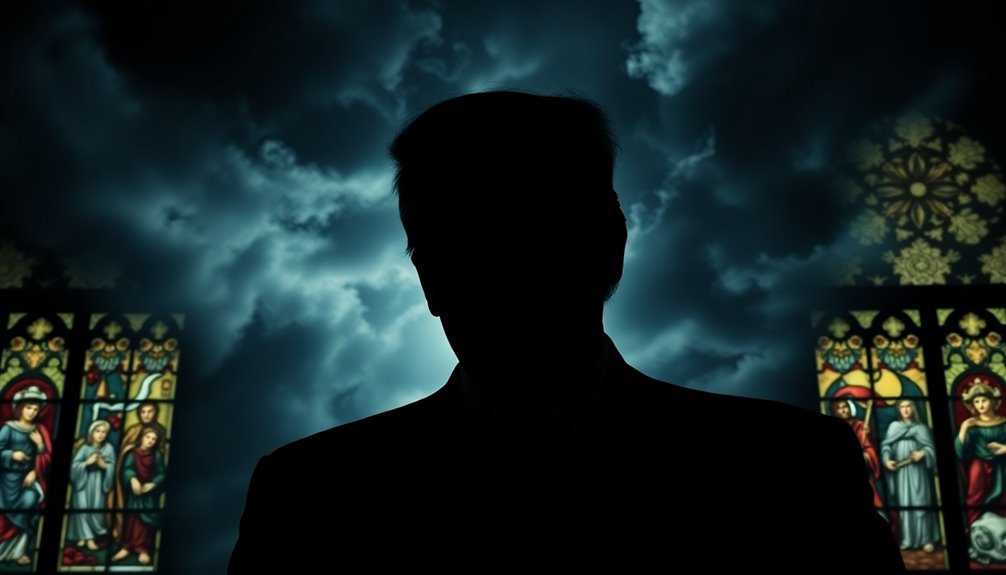
As you consider faith-based political engagement, think about how individual moral responsibility shapes your beliefs and actions in the political arena.
Reflect on how your community's values influence the collective approach to issues like abortion and judicial appointments.
It's crucial to examine whether this alignment truly reflects Christian teachings or simply serves as a means to political ends.
Individual Moral Responsibility
Engaging in faith-based political engagement means taking individual moral responsibility seriously. As a Christian, you're called to align your political choices with core values like compassion, humility, and justice for the marginalized. This means critically evaluating political leaders against biblical teachings. You can't support someone simply because they align with your party; you must ensure that your support doesn't compromise your ethical principles.
The rise of figures like Trump underscores the importance of this discernment. Loyalty to a leader can easily overshadow your commitment to Christ's teachings. You need to uphold integrity and truth in your political engagement, challenging any rhetoric or behavior that contradicts the gospel message.
This isn't just about politics; it's about reflecting Jesus' love and care, especially towards the needy and oppressed. Your faith-based political engagement should encourage you to advocate for policies that embody these values, pushing back against fear-driven loyalty that can lead you astray.
Community Moral Reflection
Your individual moral responsibility naturally extends to your community, prompting a collective reflection on the ethical implications of political engagement. As you navigate your faith and political choices, consider how your support for certain figures aligns with the teachings of humility, charity, and care for the marginalized.
The evangelical support for Trump reveals a tension between traditional Christian values and the pursuit of political power, raising crucial questions about your community's prioritization of influence over moral integrity.
The biblical caution in 2 Thessalonians about a lawless figure serves as a reminder for you and your fellow believers to critically evaluate political leaders' character and actions. Many in your community may justify their allegiance based on strategic issues like Supreme Court appointments, but this approach risks neglecting a comprehensive moral evaluation.
As you engage in community discussions, reflect on the potential for idolatry within political movements. It's essential to discern true faith from mere political loyalty.
Ultimately, the choices you make together can either reflect the values of your faith or compromise them in the pursuit of power. Prioritize moral integrity in your collective political engagement to foster a community that truly embodies its beliefs.
Final Thoughts on Trump

Navigating the complex relationship between Trump and evangelical Christianity reveals a profound shift in how faith and politics intertwine.
Donald Trump, the former president, has embraced evangelical rhetoric, transforming campaign rallies into emotional gatherings reminiscent of sermons. Despite his personal controversies, including multiple marriages and allegations of misconduct, evangelical support remains robust, often justified by the political leverage he provides.
Many evangelicals celebrate Trump's Supreme Court appointments as a significant victory, particularly regarding anti-abortion policies, illustrating a notable change in the political landscape. His followers have even drawn comparisons between Trump and biblical figures, framing him as divinely chosen, which raises concerns about idolatry and pride that traditional Christian teachings warn against.
The theological implications of Trump's presidency highlight a troubling departure from core Christian values, as the alignment of faith with political power can distort the essence of both.
As you reflect on this unique blending of faith and politics, consider how this relationship may influence future generations. The ongoing discourse surrounding Trump and evangelicalism will likely shape the intersection of religion and politics for years to come.
Additional Resources
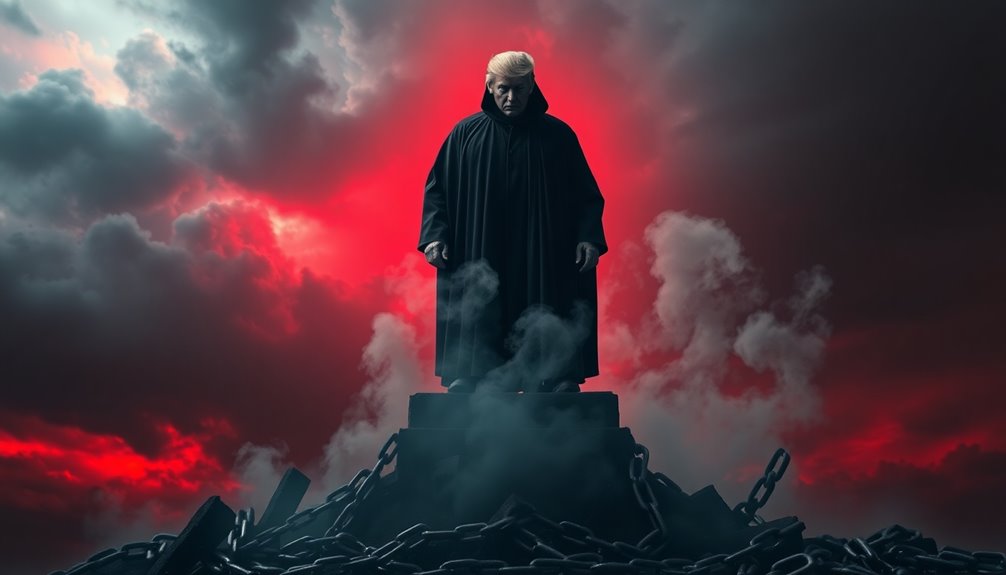
Exploring the theological implications of Trump's influence on evangelicalism can deepen your understanding of the current political climate.
To further your insights, consider diving into various resources that analyze the characteristics of the Antichrist in relation to modern political figures like Trump. Numerous theological texts highlight traits such as charisma and deception, which observers often connect to Trump's behavior.
Books and articles on biblical prophecy, especially those focusing on Revelation and Daniel, provide a solid foundation for understanding the Antichrist concept. These texts discuss how a figure opposing Christ may lead many astray, prompting critical reflections on Trump's political stance.
Additionally, scholarly articles and religious commentaries explore the intersection of faith and politics, examining how evangelical support for Trump raises theological questions. Some supporters argue that his actions align with biblical prophecies, despite contradictions with core Christian values like humility and service.
Engaging with these resources can help you discern the nuanced relationships between faith, politics, and the portrayal of figures like Trump within the context of Antichrist narratives.
Frequently Asked Questions
What Specific Actions Link Trump to the Concept of the Antichrist?
When exploring the concept of the Antichrist, you might consider characteristics often associated with such figures.
People typically look for someone who displays charisma, manipulates followers, and creates division.
You'd examine actions that evoke strong reactions, like polarizing statements or controversial policies.
Additionally, consider how their leadership style influences public opinion and whether it fosters an environment of fear or loyalty.
These factors can provide insight into the connection between any figure and the Antichrist archetype.
Are There Any Biblical Prophecies About Trump?
You might find that there aren't any specific biblical prophecies directly mentioning Trump.
The Bible contains various prophecies about leaders and events, but they're often interpreted in many ways.
Some people may draw parallels between current events and scripture, but these interpretations can be subjective.
It's essential to approach such discussions with an open mind and consider the broader context of biblical teachings rather than focusing solely on individual figures.
How Do Different Religious Groups View Trump as Antichrist?
You'll find that different religious groups have varied perspectives on political figures like Trump.
Some view him as a potential embodiment of traits associated with an antichrist figure, focusing on his controversial policies and rhetoric.
Others regard him as a champion for their beliefs, seeing a divine purpose in his leadership.
Ultimately, interpretations depend on the theological lens through which each group examines his actions and statements in relation to their faith.
What Are Secular Perspectives on Trump as Antichrist?
Secular perspectives on political figures often focus on their actions and policies rather than religious interpretations.
When you consider Trump, many critics view his behavior and rhetoric as divisive, undermining democratic norms. They analyze his influence on social issues and the environment, arguing that his leadership style promotes conflict rather than unity.
These viewpoints emphasize the importance of accountability and fact-based assessments over religious narratives, framing discussions around governance rather than prophecy.
How Has Public Opinion Shifted Regarding Trump and Antichrist Claims?
You've likely noticed how public opinion about political figures can change rapidly.
Over time, perceptions of controversial claims often fluctuate based on events and media coverage. In Trump's case, opinions have shifted due to various scandals, policy decisions, and public statements.
Some people have become more critical, while others remain supportive. This dynamic creates a complex landscape where beliefs about his character and actions can polarize and evolve dramatically.

